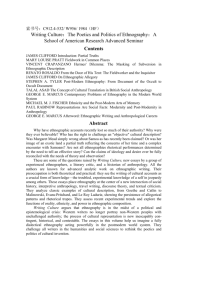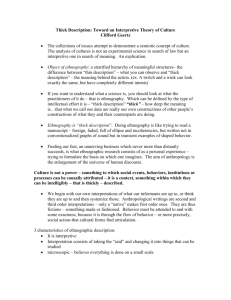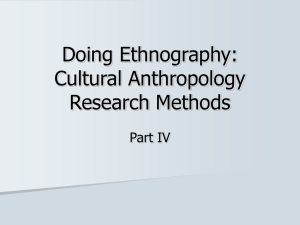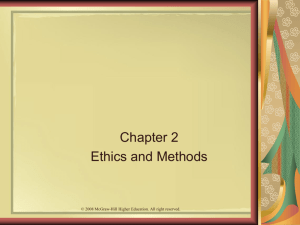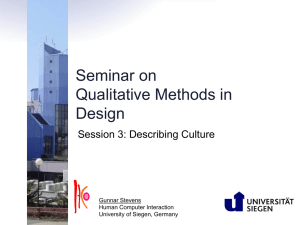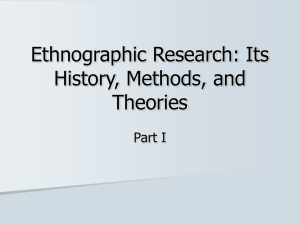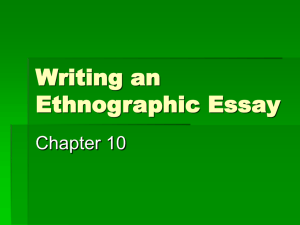Ethnographic “Truth”
advertisement
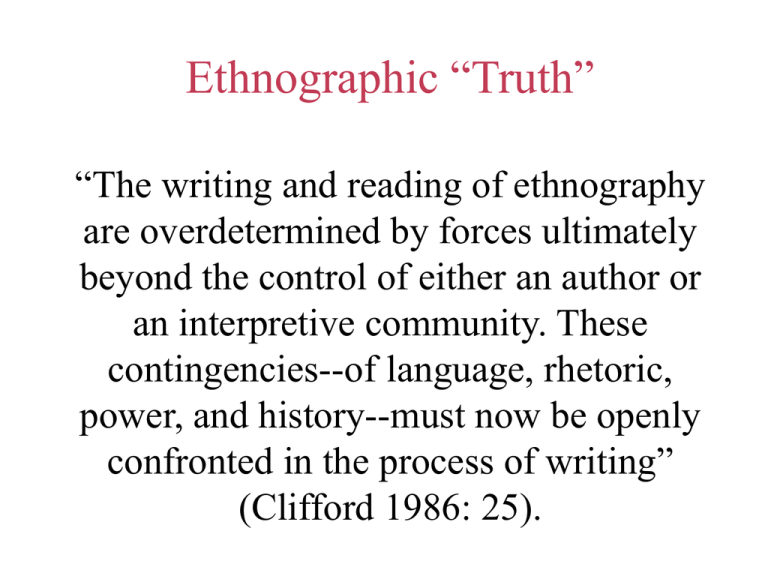
Ethnographic “Truth” “The writing and reading of ethnography are overdetermined by forces ultimately beyond the control of either an author or an interpretive community. These contingencies--of language, rhetoric, power, and history--must now be openly confronted in the process of writing” (Clifford 1986: 25). Realist Ethnographies (conventions) • • • • Experiential authority-Ethnographic form-One point of view--, Interpretive omnipotence-- Experiential Authority • absence of author, • academic credentials, • audience expectations Particular style (Ethnographic form) • arrangements of presentation, editing process • “Early in the morning each village almost literally explodes. Asak and odok come down and the village reveals itself for what it is, a conglomeration of individuals of all ages, each going his own way in search of food and water, like a plague of locusts spreading over the land” (Turnbull, The Mountain People, 1971). Third convention: Absence of native point of view • Monovocality • Closely edited quotations • Verbatim transcriptions Interpretive Omnipotence • final word, • link to a theoretical approach Interpretive Anthropology • Science and Literature start to coexist • Changing of mentality • Redressing of ethnocentric past Writing … not only as a method • influenced by politics, • intentionality, • positionality, No longer a marginal, or occulted, dimension, writing has emerged as central to what anthropologist do both in the field and thereafter. The fact that it has not until recently been portrayed or seriously discussed reflects the persistence of an ideology claiming transparency of representation and immediacy of experience (Clifford, 1986: 2). It draws attention two aspects of anthropology • to the historical predicaments of ethnography--tied to a Western mentality • the fact that ethnography is interpretation, invention and not an unbiased, totally objective representation of a culture--literary processes affects: 1. cultural phenomena 2. audience Literary Process • metaphor, • figuration, • narrative style Literary processes • metaphor, • figuration, • narrative style Ethnographic writing (art) is characterized in at least six ways • contextually • rhetorically • institutionally • generically • politically • historically Classicism: artistic and academic movement characterized by the admiration and imitation of Greek and Roman literature. Modernism: an artistic (and sometimes an academic) movement that represents a wide range of experimental and avant-garde trends in the literature. Example: “Each in His Own Way” Pirandello 1930’s MODERNISM VERSUS POSTMODERNISM J.F Lyotard “The Postmodern Condition” (1977) • • • • Attacked the totalizing notion in modernism Representing wholeness, truth ness “Writing Culture” Clifford and Marcus (1986) “Anthropology as a Cultural Critique” Marcus and Fisher (1986). • Stephen Tyler “Post-modern Ethnography: From Document of the Occult to Occult Document (1986) Stephen Tyler • • • • Evocation rather than representation The split between orality and literacy One perspective (literacy) Versus polyvocal present of multi realities (orality). • Object (anthropologist) with subject (the Other) Timothy Mitchell • “Orientalism and the Visionary Order”1989 • The vision of the Other • “The visual Western episteme,” THE WEST The observer Culture History ORDER THE REST The other Nature Stories SAVAGE Noble Barbarian Wise Evil State: JUSTICE UTOPIA Paradisiac Communist Innocent Illusory Thought: REASON Here Elsewhere
